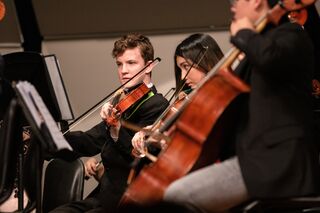Teamwork
On Playing Together
How making music with others can enrich our lives and our society.
Posted June 11, 2020

In the aftermath of the Second World War, Japanese violin teacher Shinichi Suzuki devoted his life to using music instruction as a means to cultivate sensitivity, compassion, and cooperation amongst groups of people. Applying Buddhist principles to his teaching, he developed what would become known worldwide as the Suzuki Method. The method was originally based on using group music-making to encourage a more peaceful and harmonious world.
Playing with others can help us to cultivate a rich experience in music and life. In making music with others, we are compelled to exercise patience, self-reflection, empathy, and cooperation with ourselves and with others. The very act of playing together requires us to be sensitive not only to the sounds we generate, but also to music being made by another. We are compelled to develop an ear that is receptive to our environment. This receptivity not only enhances our relationship with others, it cultivates our own music-making and musicianship. It also can be of great help in dealing with issues like performance anxiety.
Like group therapy, the small ensemble or jam group can be a time for helping one another through challenges in our personal musical experience. Encouragement, advice, and collective wisdom can come from a healthful group setting. The musical group will often have members with more or less experience, which can be an opportunity for mentoring and learning. Through the collective wisdom of the group members, both musical and personal life difficulties can be worked-through and mastered through a cooperative experience.
Some small ensembles are made up of a regular group of friends who share regular experiences of music-making together. Over the course of years, collaborative music-making on a regular basis becomes an experience of mutual support. Like all relationships, group playing requires conscientious attention and responsibilities to each other. Our best and worst moments can occur within a group. By carefully building supportive membership, we allow those moments to arise with each other, and we provide a place to become the musicians and people we wish to be. There are conditions that can be useful in forming and building a strong group.
Musicians should be able to agree on the purpose of the group. Is the intention to become a performing group or is it a regular meeting to make music together? Are all of the members of the group expected to be of some technical proficiency, or is there room for different abilities? What will the makeup of instruments be? What does the makeup of instruments require of us in our playing? How do we handle difficulties within a group? Is there a leader or does the group share leadership? These are a few important questions that could be considered when starting or joining a musical ensemble.
The dynamics of a group will become more complicated with each additional member. Some groups have two friends. The duo can be the least complicated in group dynamics, but will require the cultivation of empathy and cooperation. The trio, quartet, and quintet will each add a level dynamics that complicate and enrich the musical experience. Generally speaking, the more members of a group, the more personal responsibility each member will have to the group.
Some groups play composed music that strictly follows a score, and requires attention to the composer’s directions. Other groups are jam groups that mostly play improvisationally. It can be useful for each of these groups to spend time in making music outside of their main focus. Classical groups can find great opportunities for attentive cooperation in improvisational music-making. The same is true for jam groups who make time to play from a written chart. Cross-training will offer new insights into the group’s usual musical experience.
One can also cultivate playing with others by themselves. Going into nature with the instrument, listening to the rhythms of a stream, the song of a bird, or the tempo of traffic can be used as an accompaniment to one’s own music-making. The experience requires us to become sensitive listeners to ourselves and to our environment.
Group playing will bring out the best and the worst in our playing and our personalities. Through cooperation, thoughtfulness, and empathy, groups can be a useful way to make our musical experience and our lives a little richer.


